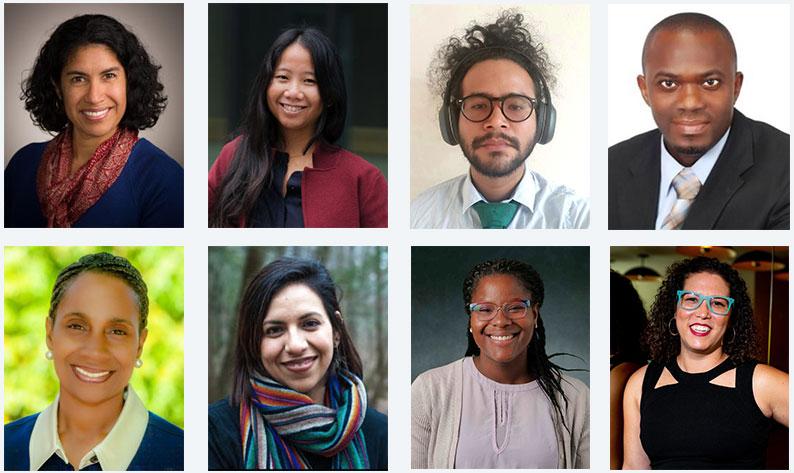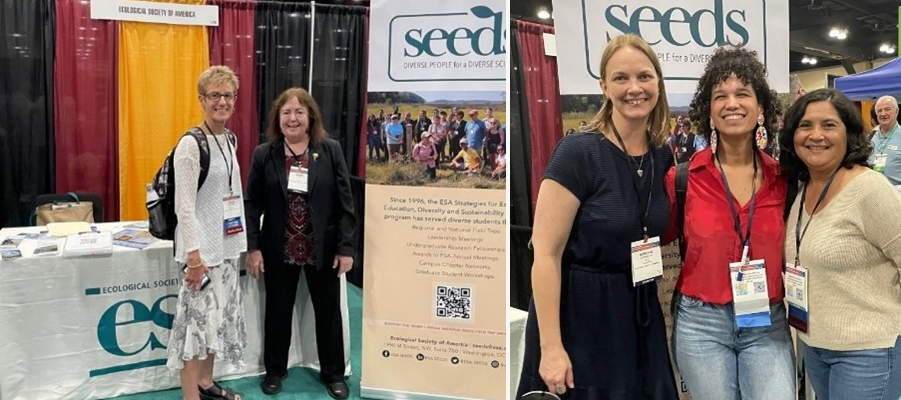ESA DEIJ Initiatives Leading to Transformational Impacts
By Carmen Cid, Chair, ESA Diversity Committee
Diverse environmental perspectives that integrate social and ecological knowledge are needed to manage today’s complex environmental problems for a sustainable future. This calls for relevant programs and sustained resources to build ESA’s capacity to strengthen Equity and Excellence in Ecology.
How Is ESA Contributing to That Goal?
We are transforming the Society by providing infrastructure and expertise on creating an inclusive and culturally responsive climate for the discipline of ecology. Through web events, publications and meetings, we are building awareness of DEIJ throughout our community. We also take violations of our code of conduct seriously and have put in place a safe and anonymous reporting system. With our Excellence in Ecology Scholars program, we are building a supportive network of experts on socioecological research who represent the diverse faces and perspectives in ecology we need in today’s environmental workforce.

ESA Excellence in Ecology Scholars
We are developing educational resources to guide ESA members who want to change their home institutions and workplaces into more inclusive mentoring environments for all ecologists, of all identities and backgrounds, with the career skills to engage all communities to tackle 21st century environmental problems.
We are working with other professional societies, employers across all sectors, academic institutions and our own ESA sections to engage and mentor the broader community of students and early career professionals who are ready and willing to make a difference in today’s evolving environmental workforce. We offer timely guidance to further their professional skills and ecological knowledge through programs such as SEEDS and EcologyPlus.
Transformational Impacts
Under the aegis of the Diversity Committee, ESA’s DEIJ initiatives are making transformational impacts that permeate the Society:
- Between 2015-2022, ESA members from minority racial and ethnic groups grew 39%
- DEIJ-focused presentations and workshops at the Annual Meeting grew from 11 in 2018 to 97 in 2023
- Anti-racism and bystander training for ESA leadership and staff is in its third year
- Since 2021, ESA publications have created the Black Voices collection and regularly publish issues or articles on inclusive ecology education and DEIJ concerns
- Since 2022, ESA provided or committed support for publication charges of ~$15,000 for five scientists
- Eight scholars have been awarded $40,000 as Excellence in Ecology Scholars over 2 years
- ESA’s top leaders are engaged in partnerships to learn from and enhance the visibility of ecology at SACNAS, MANRRS and AISES.
- In 2022-2023, SEEDS organized 10 in-person events and 7 virtual meetings reaching more than 300 students and another 857 students in 33 active chapters.

ESA leaders at 2022 SACNAS (L-R): President Sharon Collinge; Diversity Committee chair Carmen Cid; ESA Society Programs Director Adrienne Sponberg; Angelique Rosa Marin (SEEDS alumna; attendee) and ESA Diversity Committee member Concepcion Rodriguez
An Enduring Foundation
ESA has a long history of externally grant-funded programs like SEEDS managed by the Office of Education and Diversity Programs, directed by Teresa Mourad and more recently, LEAPS Realizing Inclusion in Societies for Environmental Biology (RISE), led by Adrienne Sponberg, Director of Society Programs. Resources are needed to keep ESA’s DEIJ initiatives going, to lay a successful career pathway for broader participation, perspectives, community engagement and action to meet today’s environmental sustainability goals.
The time is now! Join us in promoting and donating to the newly established ESA Equity and Excellence in Ecology Endowment. Together we can ensure that ESA has the means to consistently support and empower future generations of diverse environmental leaders in perpetuity.
Donate to the ESA Equity and Excellence in Ecology Endowment